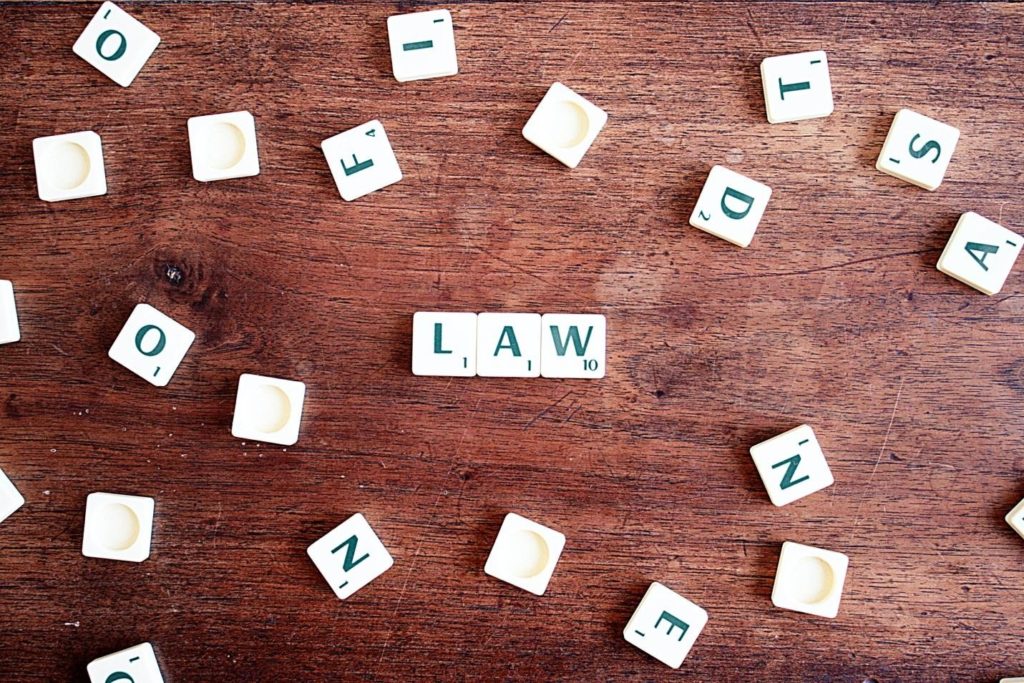Crypto tokens are considered tradable assets. A single token can act as a unit that denominates a particular cryptocurrency. It can also represent other valuable items.
With that in mind, the question then becomes whether these crypto-assets fall in the realm of securities. If so, would they be subject to the same laws and regulations that govern securities? If not, which government agency might be responsible for their oversight, and which laws and regulations apply to them?
This article explores the challenging new legal frontier that is crypto law.
What Is Blockchain?
Blockchain is a crypto term that refers to a distributed or decentralized database shared between different nodes in a computer network and stores information in digital format.
Blockchains are best known for the critical role they play in cryptosystems such as Ethereum and Bitcoin when it comes to maintaining a decentralized and secure log of every transaction that occurs. It guarantees the security and fidelity of recorded data, generating trust among users without relying on any third-party entity.
While a blockchain is essentially a database, data is structured differently from what you would find in and expect from a typical database. It collects information from different nodes and consolidates it together in clusters referred to as blocks.
Each block holds a set of information and has a specific storage capacity. Once it reaches full capacity, the block is closed, and a link to the previously filled block is generated. Any newly-formed information is added to a new block which will then be linked to the chain once it fills up. You end up with a chain of blocks of data, otherwise known as the blockchain.
The structure of a conventional database consists of tables that store data. On the other hand, the structure of a blockchain consists of blocks that store data which are then strung together. Each block has a unique timestamp indicating when it was added to the chain and a unique identifier known as a cryptographic “hash.” The result of this unique setup is a detailed timeline of information that cannot be reversed or modified.
The function of the hash isn’t just to protect the information contained within the block by preventing anyone without the required code from accessing this information; it also protects the block’s position on the chain by identifying its predecessor.
The hash consists of a set of numeric and alphabetical characters that can be up to 64 digits long. As soon as new information is added to the blockchain, it is encrypted with a hash, rendering it permanent and unchangeable.
Even if someone hacked into one of the computers on the network and tried to tamper with the data for their personal gain, they would still be unable to modify the information held by the other nodes. The modified record would easily be identified and rectified since it won’t match the identifiers contained by the majority.
How Blockchain Works
To understand how blockchain works, you first need to understand why it is created the way it is, i.e., linked blocks of information that cannot be modified. The answer to this is simple.
Blockchain is designed to allow digital information to be logged, stored, and distributed but not modified. It is the foundation of immutable and publicly-accessible ledgers with transaction records that cannot be deleted, destroyed, or altered. For this reason, blockchains are also referred to as Distributed Ledger Technology (DLT).
Although this technology garnered widespread use in 2009 with the launch of Bitcoin, the blockchain concept was first proposed in 1991 in a research project. Today, DLT is used in several applications, including smart contracts, online voting, real estate and property records, licenses and copyrights, insurance policies, medical records, supply chain tracking, Non-Fungible Tokens (NFTs), and several different cryptocurrencies.
Below is a step-by-step breakdown of how blockchain works.
- A new transaction is entered.
- The transaction gets transmitted to a global, peer-to-peer network of distributed computers scattered across the world.
- This network of distributed computers then confirms the validity of the transaction by solving a series of equations.
- Once the transactions’ legitimacy is confirmed, they are consolidated into blocks of information.
- These blocks are then linked together to create a long history of transactional information that cannot be deleted or modified.
- The transaction is deemed complete at this point.
Keep in mind that a blockchain can be public or “permissionless,” meaning it is open for anyone to participate or view. On the other hand, it can be “permissioned,” meaning that participation and viewership can be limited to a specific group of participants or a single administrator.
What Is a Blockchain in Crypto?
So far, we’ve established that blockchain is a distributed ledger technology. At the very basic, it is a database system that records a chain of transactions clustered into blocks with a unique timestamp and identifier that anyone can view.
Blockchain is the underlying technological framework upon which almost all cryptocurrencies run on, including Bitcoin and Ethereum. They are secured by networks of blockchain, meaning that there’s a massive amount of computing power verifying the accuracy of all the transactions that take place at any given time.
Blockchain is fundamental to all the transactions on the blockchain. It allows payments to be made securely between different users who don’t know each other without having to rely on a third-party intermediary such as a bank to verify the transactions.
The cryptographic nature of blockchain networks makes them more secure than your standard credit card transaction. For instance, when making a cryptocurrency payment using Bitcoin, you’re not required to part with any sensitive information, which completely eliminates any risk of your financial details getting compromised or getting your identity stolen by hackers.
Blockchain Law
The World Economic Forum (WEF) predicts that by 2027, 10 percent of the world’s gross domestic product (GDP) will be stored on DLT. Blockchain is a complete game-changer as far as how financial transactions are conducted, and policymakers have had to amend various regulatory and legal frameworks to adopt blockchain transactions.
Federal Action
Federal agencies have been in the process of evaluating DLTs like blockchain in a bid to improve efficiency, transparency, and trust in the way government information is shared. The Emerging Citizen Technology under the US Government Services Administration launched the US Federal Blockchain program. It was targeted at US businesses and federal agencies interested in the use of DLT within the government.
State Action
In 2015, Vermont became the first state in the country to address the use and implementation of blockchain. The state executive directed the Secretary of State, the Department of Financial Regulation, and the attorney general to explore the risks and opportunities associated with the creation of a validity presumption for records and electronic information that run on blockchain technology and report their findings to the General Assembly.
A year later, the General Assembly came up with the evidentiary standards that would be used to establish the validity of records using DLT with Vermont’s rules of evidence.
In 2017, Nevada, Illinois, Delaware, and Arizona, followed suit to enact or adopt blockchain legislation.
Nevada
Nevada passed a law that effectively-recognized blockchain as a form of electronic record keeping, in line with the Uniform Electronic Transactions Act. The new law made it illegal for local governments to impose restrictions or taxes on businesses, individuals, and institutions using blockchain technology.
Illinois
In Illinois, the General Assembly endorsed a joint resolution following the creation of the Illinois Blockchain Initiative (IBI). IBI is an association of various state and county agencies made up of departments of Innovation and Technology, Financial and Professional Regulation, Insurance, Commerce and Economic Opportunity, and the Recorder of Deeds—Cooks County.
The Illinois Legislative Blockchain and Distributed Ledger Task Force was born out of this resolution and was charged with studying how and whether the municipal, county, and state governments could potentially adopt a blockchain-based system to enhance recordkeeping and service delivery in general.
Delaware
In Delaware, a new law was enacted making it mandatory for state-formed corporations to adopt the use of blockchain technology in the creation, management, and maintenance of corporate records—stock ledger included.
Arizona
Arizona enacted two blockchain statutes. The first bill set out detailed guidelines for electronic signatures done using blockchain technology. The second bill prohibited state agencies and businesses from requiring a person to be subject to or use electronic firearms tracking technology such as DLTs and blockchain.
Other States
Several other states, including Iowa, New Jersey, New Mexico, New York, South Carolina, California, and Wisconsin, have since enacted blockchain legislation to allow for the adoption of DLT in various public and private sector applications.
New Crypto Laws

By the end of 2021, 33 states and Puerto Rico all had pending cryptocurrency legislation. A total of 17 states adopted resolutions or enacted laws governing the use of crypto in the respective states. Below is a list of some of the notable ones.
- Arizona established a blockchain and crypto study committee.
- Arkansas amended the Uniform Money Services Act to include cryptocurrency and other virtual currencies and clarified how virtual currencies would be regulated under the Uniform Commercial Code.
- Hawaii passed a resolution to request the Department of Commerce and Consumer Affairs to review its previous ruling on asset reserve requirements for crypto companies and other virtual currency businesses to transact in the state. It also aligned its asset reserve requirements for these firms with those of other states in the country.
- Indiana enacted the revised Unclaimed Property Act from the previous legislation to include virtual currency.
- Louisiana passed a resolution that commended Bitcoin for successfully becoming the first-ever decentralized trillion-dollar asset and encouraged local and state governments to come up with ways that could help them leverage the increasing use of the novel technology.
- The North Dakota executive called on the legislative management to consider conducting a feasibility and desirability study of the regulation of special-purpose depository institutions and other state entities conducting business activities involving virtual currency.
How to Pick the Best Cryptocurrency Law Firm
The increasing use of digital assets, including cryptocurrency, has brought with it a complex array of legal issues related to:
- Compliance issues including reporting, custody, and valuation;
- Regulatory status including the criteria required to register as money services businesses, securities exchanges, investment firms, investment advisors, commodity trading advisors, commodity pool advisors, and broker-dealers;
- Securities transactions, including mergers & acquisitions (M&A) transactions and initial coin offerings;
- Anti-money laundering;
- Launching exchange-traded funds and derivatives;
- Litigation.
Not all crypto law firms are created equal. You need to pick a team of lawyers who understand blockchain technology to get knowledgeable legal counsel to help you navigate this rapidly evolving sector.
Experienced crypto attorneys have an in-depth understanding of blockchain networks and the underlying technologies they run on, as well as crypto-related developments in distributed computing networks. A competent blockchain lawyer would be able to bridge emerging financial technologies with the existing regulatory legislation to help you find a solution.
Additionally, if you’ve fallen victim to the fraudulent actions of cybercriminals and have lost cryptocurrency and other virtual assets, the first thing you need to do is file a complaint with the following agencies:
- The Commodity Futures Trading Commission (CFTC)
- The Consumer Financial Protection Bureau (CFPB)
- The Federal Trade Commission (FTC)
- The US Securities and Exchange Commission (SEC)
Next, consider filing a cryptocurrency lawsuit if you establish that the actions (or lack thereof) of the crypto exchange or digital wallet were responsible for the theft of your crypto assets.
Litigation, in this case, could take the form of an individual civil suit or a class action depending on the specific circumstances surrounding your claim and the number of affected parties. It’s always a good idea to consult a cryptocurrency lawyer to determine which path is right for you.
Need help from a legal expert? Chat online with a Laws101 attorney right now.
